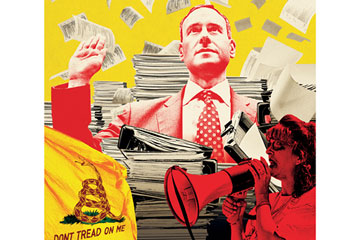
How the agency everyone hates went rogue.
Toby Marie Walker, the spry grandmother who heads the Waco Tea Party, had big plans for the 2012 election year: a blogging boot camp for local Texas activists and the purchase of the state voter file to get voters to the polls. But as the year dawned, she found her organization hobbled by a faceless foe: the Internal Revenue Service, which had been sitting on her group's application for nonprofit status since July 2010.
As a result, the group was forced to set aside money for a possible tax bill if its application was denied. And donors became skittish after a rumor had gone around that the feds were investigating anyone who gave to Tea Party groups. "Donors didn't want to be associated with us," Walker said. "They didn't want the IRS to start investigating them too."
Paranoia about the IRS is common, but in this case it was justified. The feds were intensifying their scrutiny of Tea Party groups nationwide and collecting lists of donors (although the donors themselves were not pursued). Dozens of conservative nonprofit groups, often small organizations without money for lawyers, found themselves caught in a maze of bureaucratic delay and stymied by demands for seemingly unnecessary paperwork.
The IRS's questions, asked under penalty of perjury, bordered on the absurd: Would officers of the organization run for public office one day? What were the conversations at meetings? What was being said on the group's Facebook and Twitter accounts? One Ohio-based group, American Patriots Against Government Excess, says the IRS asked for a list of readings from its book club, a synopsis of each text and any materials handed out at meetings.
The IRS has a legal responsibility to ensure that groups that earn tax-free status by claiming to promote "social welfare" don't actually exist with the "primary" goal of influencing elections. Under its vague rules, such groups can promote a broad ideological agenda as long as they don't spend most of their time and money trying to elect and defeat specific candidates. That line has long been notoriously blurry. But outside lawyers who had processed political nonprofit applications for decades noticed a change at the IRS in 2010 and 2011. "They weren't just trying to figure out if [nonprofit groups] were involved in politics," says Cleta Mitchell, a longtime conservative lawyer who represented several groups stonewalled by the IRS. "I think they were trying to bury them in paperwork and hope they would go away, and a lot of them have."
As questions swirled, the IRS repeatedly denied that anything was amiss. "I can give you assurances," former IRS commissioner Douglas Shulman told a House committee in March 2012 when asked about claims of political bias. He was an appointee of George W. Bush and spoke of his agency's pride in "being a nonpolitical, nonpartisan organization." He said, "What's been happening has been the normal back and forth that happens with the IRS."
